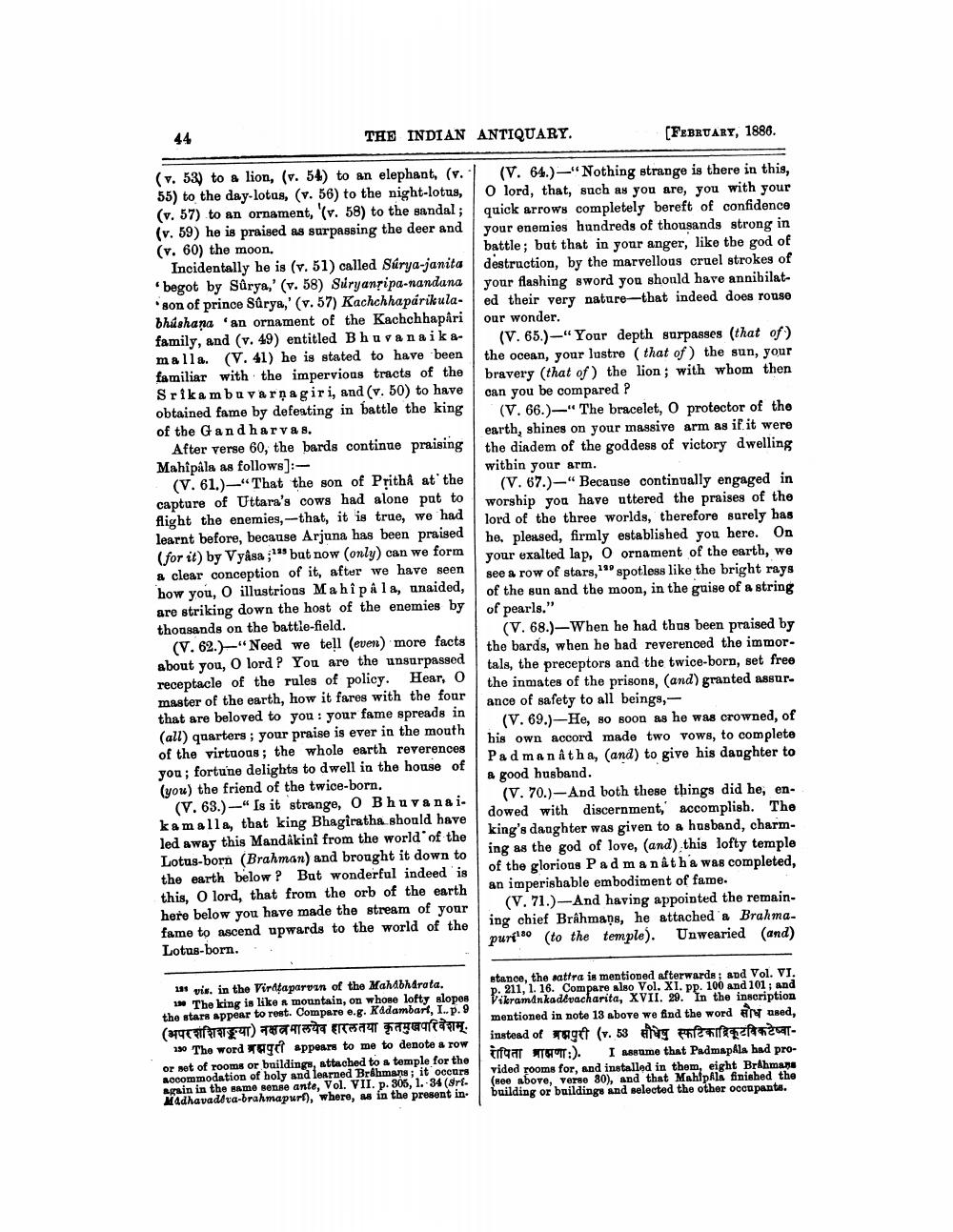________________
44
THE INDIAN ANTIQUARY.
(FEBRUARY, 1886.
(v. 53) to a lion, (v. 54) to an elephant, (v.1 (V. 64.)-"Nothing strange is there in this, 55) to the day-lotus, (v. 56) to the night-lotus, o lord, that, such as you are, you with your (v. 57) to an ornament, '(v. 58) to the sandal ; quick arrows completely bereft of confidence (v. 59) he is praised as sorpassing the deer and your enemies hundreds of thousands strong in (v. 60) the moon.
battle; but that in your anger, like the god of Incidentally he is (v. 51) called Sürya-janita destruction, by the marvellous cruel strokes of begot by Sûrya,' (v. 58) Suryanripa-nandana your flashing sword you should have annibilat* son of prince Sürya,' (v. 57) Kachchhaparikula- ed their very nature-that indeed does rouse bhúshara 'an ornament of the Kachchhapäri our wonder. family, and (v. 49) entitled Bhuvana ika- (V. 65.)-"Your depth surpasses (that of) malla. (V. 41) he is stated to have been the ocean, your lustre (that of the sun, your familiar with the impervious tracts of the bravery (that of the lion; with whom then Srika mbu varnagiri, and (v. 50) to have can you be compared ? obtained fame by defeating in battle the king (V. 66.)—"The bracelet, О protector of the of the Gandharvas,
earth, shines on your massive arm as if it were After verse 60, the bards continue praising
the dindem of the goddess of victory dwelling Mahîpåla as follows]:
within your arm. (V. 61.)—“That the son of Prith at the
(V. 67.)-"Because continually engaged in capture of Uttara's cows had alone pat to
worship you have uttered the praises of the flight the enemies,-that, it is true, we had
lord of the three worlds, therefore surely has learnt before, because Arjuna has been praised
he, pleased, firmly established you here. On (for it) by Vyâsa ; 1" but now (only) can we form
your exalted lap, O ornament of the earth, we a clear conception of it, after we have seen
see a row of stars, 19' spotless like the bright rays how you, O illustrious Mahipala, unaided,
of the sun and the moon, in the guise of a string are striking down the host of the enemies by
of pearls." thousands on the battle-field.
(V. 68.)-When he had thus been praised by (V. 62.)—"Need we tell (even) more facts
the bards, when he had reverenced the immorabout you, O lord ? You are the unsurpassed
tals, the preceptors and the twice-born, set free receptacle of the rules of policy. Hear, O
the inmates of the prisons, (and) granted assurmaster of the earth, how it fares with the four
ance of safety to all beings,that are beloved to you: your fame spreads in
(V. 69.)-He, so soon as he was crowned, of (all) quarters; your praise is ever in the mouth
his own accord made two vows, to complete of the virtuous; the whole earth reverences
Padmanatha, (and) to give his daughter to you; fortune delights to dwell in the house of
a good husband. (you) the friend of the twice-born.
(V. 70.)- And both these things did he, en(V. 63.)-" Is it strange, O Bhuvanai. kamalla, that king Bhagiratha should have
dowed with discernment,' accomplish. The led away this Mandakini from the world of the
king's daughter was given to a husband, charmLotus-born (Brahman) and brought it down to
ing as the god of love, (and) this lofty temple the earth below? But wonderful indeed 'is
of the glorious Padmanatha was completed, this, o lord, that from the orb of the earth
an imperishable embodiment of fame. here below you have made the stream of your
(V. 71.)-And having appointed the remainfame to ascend upwards to the world of the
ing chief Brahmans, he attached a BrahmaLotus-born.
purpl80 (to the temple). Unwearied (and)
111 vie. in the Virtaparuin of the Mahabharata.
1 The king is like a mountain, on whose lofty slopes the stars appear to rest. Compare e.g. Kadambart, I.p.9 (भपरशंशिशङ्कया) नक्षत्रमालयेव हारलतया कृतमुखपरिवंशम्.
10 The word rage appears to me to denote a row or net of rooms or buildings, attached to a temple for the accommodation of holy and learned Brahma.ne; it occurs again in the same sense ante, Vol. VII. p. 305, 1.34 (gr. Madhavada va-brahmapurl), where, as in the present in.
stance, the sattra is mentioned afterwards; and Vol. VI. p. 211, 1. 16. Compare also Vol. XI. pp. 100 and 101, and Vikramankadłuacharita, XVII. 29. In the inscription mentioned in note 13 above we find the word en used, instead of Taget (v. 53 g Fifa froirfear ATGTT:). I assume that Padmap Ala had provided rooms for, and installed in them, eight Brahman (see above, verae 80), and that Mahipals finished the building or buildings and selected the other occupants.




